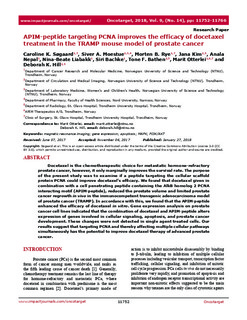| dc.contributor.author | Søgaard, Caroline Danielsen | |
| dc.contributor.author | Moestue, Siver Andreas | |
| dc.contributor.author | Rye, Morten Beck | |
| dc.contributor.author | Kim, Jana | |
| dc.contributor.author | Nepal, Anala | |
| dc.contributor.author | Liabakk, Nina-Beate | |
| dc.contributor.author | Bachke, Siri | |
| dc.contributor.author | Bathen, Tone Frost | |
| dc.contributor.author | Otterlei, Marit | |
| dc.contributor.author | Hill, Deborah Katherine | |
| dc.date.accessioned | 2019-04-01T07:50:57Z | |
| dc.date.available | 2019-04-01T07:50:57Z | |
| dc.date.created | 2017-11-10T10:43:11Z | |
| dc.date.issued | 2018 | |
| dc.identifier.citation | OncoTarget. 2018, 9 (14), 11752-11766. | nb_NO |
| dc.identifier.issn | 1949-2553 | |
| dc.identifier.uri | http://hdl.handle.net/11250/2592602 | |
| dc.description.abstract | Docetaxel is the chemotherapeutic choice for metastatic hormone-refractory
prostate cancer, however, it only marginally improves the survival rate. The purpose
of the present study was to examine if a peptide targeting the cellular scaffold
protein PCNA could improve docetaxel’s efficacy. We found that docetaxel given in
combination with a cell penetrating peptide containing the AlkB homolog 2 PCNA
interacting motif (APIM-peptide), reduced the prostate volume and limited prostate
cancer regrowth in vivo in the immunocompetent transgenic adenocarcinoma model
of prostate cancer (TRAMP). In accordance with this, we found that the APIM-peptide
enhanced the efficacy of docetaxel in vitro . Gene expression analysis on prostate
cancer cell lines indicated that the combination of docetaxel and APIM-peptide alters
expression of genes involved in cellular signaling, apoptosis, and prostate cancer
development. These changes were not detected in single agent treated cells. Our
results suggest that targeting PCNA and thereby affecting multiple cellular pathways
simultaneously has the potential to improve docetaxel therapy of advanced prostate
cancer. | nb_NO |
| dc.language.iso | eng | nb_NO |
| dc.publisher | Impact Journals | nb_NO |
| dc.rights | Navngivelse 4.0 Internasjonal | * |
| dc.rights.uri | http://creativecommons.org/licenses/by/4.0/deed.no | * |
| dc.title | APIM-peptide targeting PCNA improves the efficacy of docetaxel treatment in the TRAMP mouse model of prostate cancer | nb_NO |
| dc.type | Journal article | nb_NO |
| dc.type | Peer reviewed | nb_NO |
| dc.description.version | publishedVersion | nb_NO |
| dc.source.pagenumber | 11752-11766 | nb_NO |
| dc.source.volume | 9 | nb_NO |
| dc.source.journal | OncoTarget | nb_NO |
| dc.source.issue | 14 | nb_NO |
| dc.identifier.doi | 10.18632/oncotarget.24357 | |
| dc.identifier.cristin | 1512870 | |
| dc.relation.project | Norges forskningsråd: 239940 | nb_NO |
| dc.description.localcode | Copyright: Søgaard et al. This is an open-access article distributed under the terms of the Creative Commons Attribution License 3.0 (CC -BY 3.0), which permits unrestricted use, distribution, and reproduction in any medium, provided the original author and source are credited. | nb_NO |
| cristin.unitcode | 194,65,15,0 | |
| cristin.unitcode | 194,65,25,0 | |
| cristin.unitname | Institutt for klinisk og molekylær medisin | |
| cristin.unitname | Institutt for sirkulasjon og bildediagnostikk | |
| cristin.ispublished | true | |
| cristin.fulltext | original | |
| cristin.qualitycode | 1 | |

